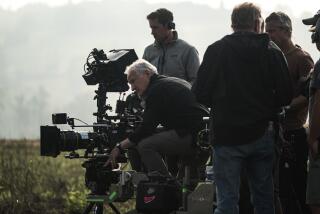Trial Finale is Only the Beginning of TV Deals : Media: McMartin story is headed for the small screen and bookstore shelves. But retelling the case presents some tricky legal and moral problems.
- Share via
Geraldo Rivera was interviewing Peggy Ann Buckey on TV. Abby Mann watched, listened--and saw the makings of a movie.
Prosecutors had just dropped charges of child molestation against Buckey, one of the original seven defendants in the McMartin Pre-School case. In that 1986 interview, Peggy Buckey was “quite eloquent” in arguing that charges against her brother, Ray, and mother, Peggy McMartin Buckey, should be dropped as well, Mann recalled Friday.
Mann, an Oscar- and Emmy-winning screenwriter and producer, recognized a theme he had tapped before: the hysteria of a witch hunt. Soon, Mann became a controversial figure in the case itself--but he got the inside track on movie and book deals. And Thursday’s not-guilty verdicts in Ray and Peggy McMartin Buckey’s trial gave Mann the happy ending he was hoping for--happy, at least, from his point of view.
But Mann and his wife, Myra, who have an 800-page manuscript in the works for Random House and say they are close to finishing a screenplay, aren’t expected to monopolize the telling of the 6-year-old McMartin case--or the perspective.
At least two other books are planned, and at least one prominent television movie producer besides Mann says he is developing a McMartin project. That producer, who requested anonymity, said he is certain other producers are considering projects as well.
“It’s definitely a TV thing,” one agent said. “Just one of those perfect, high-concept, lurid television M-O-Ws”--an acronym for movies-of-the-week. “The producer chases down participants, gets rights--and then it’s an easy sale to networks.”
Not that easy, network executives say.
Unlike the hottest true-life property of the moment--the Stuart murder case in Boston, which has CBS and The Fries Co. racing to produce the first docudrama--McMartin creates some tricky legal and moral problems. The jury’s deadlock on 13 counts creates an ambiguity: Is Ray Buckey a villain or a victim?
“None of the three networks would touch Ray Buckey’s story,” predicted Steven White, an independent producer who used to be a movie executive for both NBC and ABC. “First, the man is still accused of 13 crimes. . . . If I were sitting in my old job, I wouldn’t touch this thing with a 10-foot pole.”
“It raises so many legal and ethical questions at this point it would have to be looked at with a microscope,” said Larry Strichman, a senior executive in movie development at CBS.
“What is the story you want to tell? Is it a story of justice done or justice denied? And it’s real unclear at the moment what the answer to that question is. Unlike a documentary, it’s hard to take an ambiguous position in a docudrama.”
Producers think network qualms can be overcome, however. One pointed out that the Billionaire Boys Club docudrama was broadcast before all the trials regarding the slayings were over.
“There are no rules,” the producer said.
Hollywood’s role in the McMartin case came to prominence early. Not long after the first allegations of child molestation six years ago, several producers pitched projects to networks. Though no explicit McMartin story was produced, child abuse and molestation was a recurring subject. One CBS fictional movie last year--”Did You Know the Muffin Man?”--featured a preschool and satanic child molesters.
Mann, whose writing credits include the Academy Award-winning “Judgment at Nuremberg” in 1961, won an Emmy for “The Marcus-Nelson Murders,” a three-hour “Kojak” drama based on a true case in which a black youth was wrongly convicted of the killings of two white women. The prosecutors, the media and the community seemed blinded by hysteria, Mann said.
Gaining the confidence of the McMartin defendants, the Manns were ultimately hired as “investigators” by the defense. That and their earlier alliance with former prosecutor Glenn Stevens sparked charges from parents of alleged child molestation victims of a conspiracy to obstruct justice for monetary gain.
Stevens, who said he had asked to be removed from the McMartin trial team in October, 1985, said he and Mann agreed in March, 1986, to produce a book and movie about the case with the understanding that their discussions would become public after the trial and appeals were over. But in late 1986, Mann released interviews with Stevens in which Stevens said he doubted the defendants’ guilt. Mann said his attorneys had advised him that to withhold them would be an obstruction of justice.
Outraged parents suggested the real aim was a not-guilty verdict, which would improve the value of Mann’s movie deal. But Stevens and the Manns have said their ambition from the start has been to get the truth out.
At least two other perspectives may reach the bookstores. Ray Buckey’s lawyer, Danny Davis, and writer Gordon Dillow, former columnist for the defunct Los Angeles Herald Examiner, have a book proposal that is being pitched to a variety of publishers.
Times staff writer Lois Timnick, who covered the case from its early stages through the trial, also is planning a book.
Mann said his script isn’t a courtroom drama.
“It’s not a trial movie. It’s what happens to human beings. I intend to be fair to the parents. I don’t mean to be vindicative. . . . For the most part, I have great sympathy for the parents.”
More to Read
The biggest entertainment stories
Get our big stories about Hollywood, film, television, music, arts, culture and more right in your inbox as soon as they publish.
You may occasionally receive promotional content from the Los Angeles Times.










